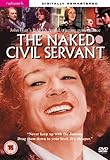Eye For Film >> Movies >> The Naked Civil Servant (1975) Film Review

Adapted from Quentin Crisp’s memoir of the same name, The Naked Civil Servant tells the story of his attempts to live his life as an openly and unapologetically flamboyant homosexual in an uncomprehending pre-war Britain. Reviled, harassed and eventually arrested (on a spurious charge of soliciting) in the Thirties and Forties, by the time of the film’s initial release in the mid-1970s, Crisp had become something of a national treasure – Britain’s self proclaimed “Stately Homo”.
Philip Mackie’s screenplay remains largely faithful to the letter of its source, at times transcribing whole passages verbatim into the first-person voice-over. As a result, much of the writing sparkles with Crisp’s wit and intelligence (“Health consists of having the same diseases as one’s neighbours”). Both the script and its director, Jack Gold, also manage to successfully capture the spirit of Crisp’s personality and worldview - an obstinate refusal to take anything seriously (“On the day war broke out I bought two large boxes of Henna”) combined with a disdain for sentimentality and a self-awareness that refused to allow him to indulge in self-pity. As a coping mechanism, this approach to dealing with the many obstacles and absurdities of British life seemed to serve Crisp well. Events, whether comic, tragic or tragi-comic, are all dispassionately observed with the same wry amusement and described with the same philosophical matter-of-factness. As he’s persecuted and abused in his youth and as his friends drift into madness and death in his later years, Crisp breezes through it all, aloof and unfazed with his dignity intact.

The film also manages to capture Crisp’s central contradiction. He flaunts his homosexuality in a hostile environment, partly out of genuine indignation that he shouldn’t be allowed to express himself as he pleases, partly out of pure bloody-mindedness (because he knows it pisses people off), and partly, as he cheerfully confesses more than once, because he needs to satisfy his own narcissism. (“Exhibitionism is like a drug,” he explains. “You get hooked!”) It’s to the film-makers’ credit that they took this on board and resisted the temptation to canonise Crisp as a brave and altruistic martyr to the cause of Gay Pride.
In other ways, however, the film has not dated well. For a start, even allowing for the tone of the source material, Gold’s direction seems unnecessarily broad, sometimes forcing the humour of the material lest we should fail to get the point. The action is punctuated by jokey inter-titles and many of the supporting characters, especially the establishment figures, are reduced to two-dimensional types, either flustered into confused embarrassment or provoked into irrational antagonism by Crisp’s shamelessness. At times it feels almost as if the film-makers, by turning these characters into such caricatures of British repression, were anxious that the audience should be in no doubt about where its sympathies ought to lie.
John Hurt’s much-admired but rather theatrical central performance (for which he won a BAFTA) also suffers from this approach. Although it’s certainly entertaining to watch, and sort of convincing in its own right, as the attached footage of Crisp being interviewed in 1971 demonstrates, it isn’t especially accurate. This isn’t in itself important since there is a world of difference between a convincing performance and an exercise in studied mimicry. But his campy musical delivery often obscures the dry irony of Crisp’s prose and robs the dialogue of its more acerbic edge.
Yet in spite of this, the subtle wretched integrity that Hurt brings to every part he plays gives the character the depth and the emotional core that Gold’s superficial interpretation may otherwise have lacked. During his abortive trial, Hurt utters the following words (which could equally have been delivered by John Merrick, the deformed character he portrayed in The Elephant Man):
“My appearance sets me apart from the rest of humanity. It is not easy for me to make human contact – with strangers it is almost impossible. I learnt many years ago the golden rule of my life: In public places I do not speak to anyone if they do not speak to me, I do not look at anyone unless they demand that I look at them. That is the only way I know of getting safely to my destination”.
It’s the only moment when Crisp, faced with the real prospect of a prison sentence, articulates the price he is being made to pay for the path he has chosen. It is one of the few moments in the film played straight, without irony, and Hurt imbues the character with a quietly tragic humanity that he has so far lacked. In one short speech he says more about the detrimental effects of conformity and prejudice than in the whole of the rest of the film put together.
Yet in a way that’s just as it should be. Like the book, the film isn’t supposed to be either a call to arms or a polemic – it’s simply meant to be a vehicle for the wit and wisdom of its protagonist and what it lacks in complexity or emotional intensity, it makes up for in entertainment. And in any case, part of what makes The Naked Civil Servant such interesting viewing in 2005 is that its slightly quaint and occasionally coy approach (particularly to sex) tells us as much about the attitudes of 1975, as those of the Thirties, Forties and Fifties.
Reviewed on: 16 Sep 2005


















